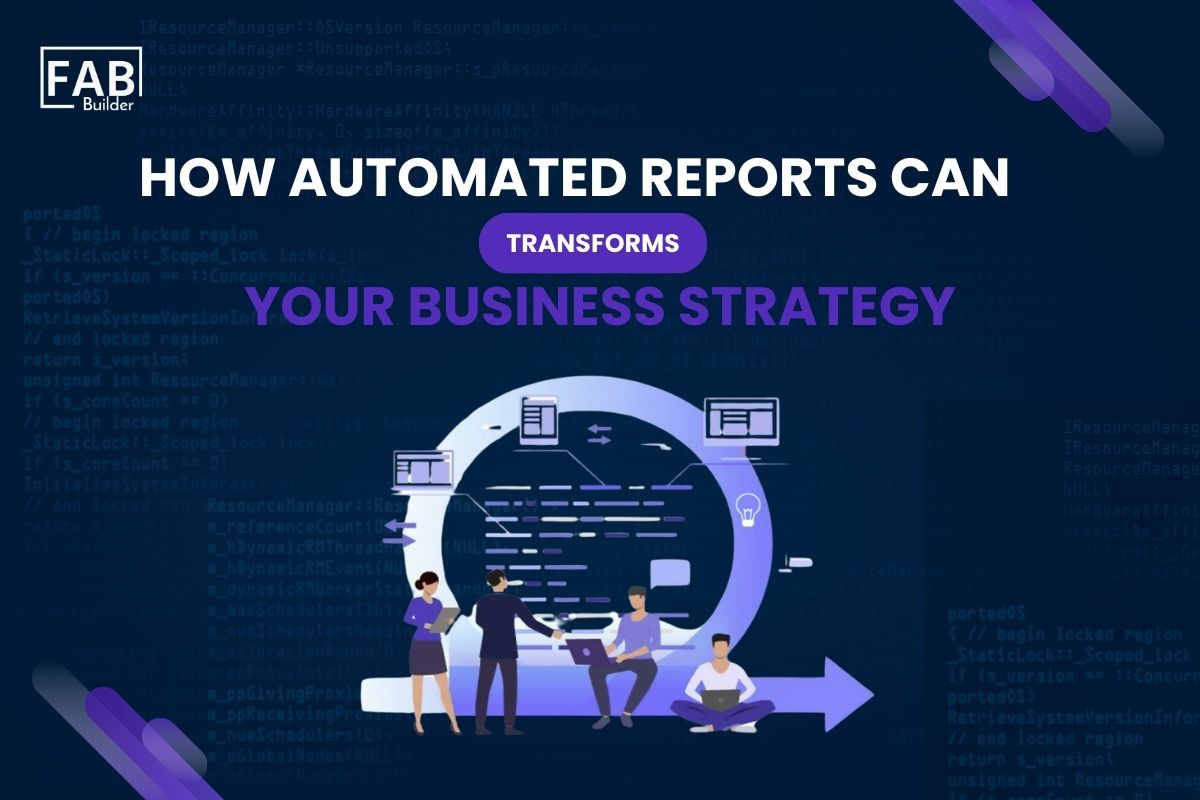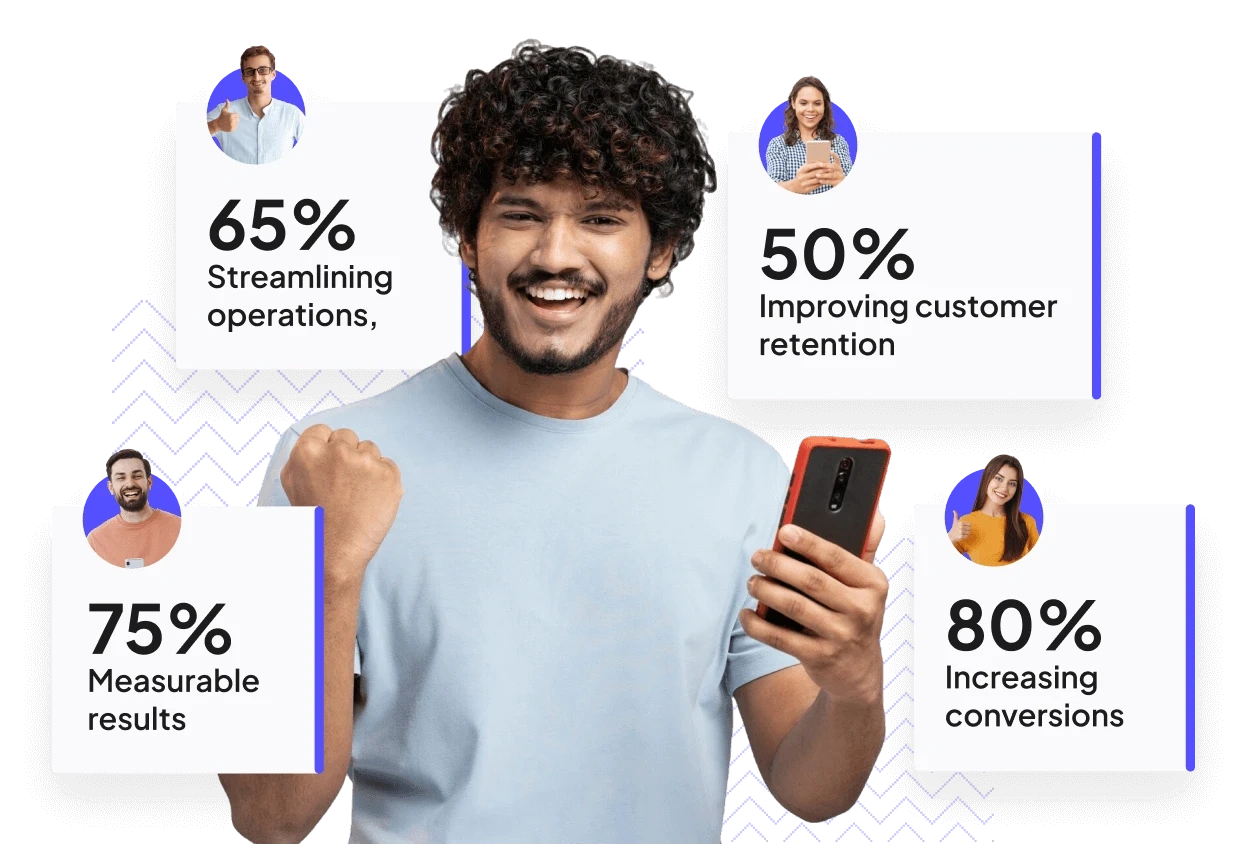Data-driven decisions are crucial to maintaining a competitive advantage in today’s fast-paced corporate world. Businesses produce mountains of data daily, and success depends on their capacity to evaluate and act upon that data. Thanks to automated reports, which have become a vital tool, businesses may now effectively convert raw data into valuable insights. This article explores how timely, pertinent, and data-backed insights from automated reports may transform your business strategy, improve operational efficiency, and spur development.
With FAB Builder Analytics, you gain access to a robust automated reporting platform designed specifically to empower businesses with instant, actionable insights. It integrates data from multiple sources and provides customizable reports to match various strategic needs.
1. Understanding Automated Reports: The Basics
Fundamentally, automated reporting is the process of creating reports without human input by using software and technology. Businesses may set up systems that gather real-time information from several sources, make customised reports, and send them to the appropriate stakeholders in the proper time, saving them the time and effort required to gather data, develop visualisations, and prepare papers. Whether it’s inventory management, sales analysis, financial reporting, or customer insights, reporting automation may be tailored to match particular requirements.
FAB Builder Analytics excels in offering real-time data visualization and multi-source data integration, which enables businesses to draw insights from sales, marketing, finance, and customer behavior analytics in one centralized platform.
- The Significance of Automation: Automation is significant because it may save time, minimise human error, and offer a more comprehensive view of performance. Companies that use automated reporting can uncover inefficiencies, recognise patterns, and make choices more quickly, which gives them an advantage in the market.
2. Benefits of Automated Reports for Business Strategy
Implementing automated reports can deliver many benefits, all contributing to a robust business strategy. Here are a few of the most substantial benefits:
- Real-time Data Access: When reporting manually, there is frequently a delay between data collection and display. Automated reporting solutions remove this latency by immediately retrieving real-time data from integrated sources, including inventory databases, accounting systems, and CRM software. Managers and other decision-makers can act quickly and by the market’s state when they have access to real-time insights. FAB Builder Analytics enables real-time insights through its advanced data processing engine, making it possible for decision-makers to make rapid adjustments based on the latest data.
- Improved Precision: Human error — whether due to simple oversight, miscalculation, or misinterpretation — is unavoidable in manual reporting. Automated reports reduce these hazards by eliminating the need for human input. Since the data is straight from reputable sources, accuracy and consistency are guaranteed. This degree of accuracy is essential for businesses that depend on data-driven strategies. FAB Builder Analytics implements AI-driven data checks that ensure the highest degree of data accuracy, which is essential for creating precise and reliable automated reports.
- Time and Cost Savings: According to current industry research, reporting automation may reduce data processing time by as much as 60%. Report compilation no longer requires teams to spend hours or even days on it, freeing up essential resources that may be used for other strategic activities. Automated reporting is a desirable investment due to the immediate financial benefits of lower labour costs and increased efficiency. With FAB Builder Analytics, businesses can further reduce time spent on data handling through its streamlined automation tools, which cut down on processing time and reduce operational costs.
- Improved Collaboration: It can be challenging for teams in huge organisations to share information. Automated reporting tools make centralised access to key metrics possible, facilitating seamless departmental cooperation. A single source of truth is available to teams, improving communication and promoting agreement on company objectives.
- Improved Understanding and Forecasting Analytics: Businesses may use automated reports to identify trends, patterns, and anomalies in historical data. Based on historical data, sophisticated automation tools — often driven by machine learning — can forecast future performance. This allows companies to take a proactive approach to strategy and adjust to changes in the market before they affect performance.
3. How Automated Reports Drive Strategic Decision-Making
Any organisation that wants to succeed has to base its strategic decisions on accurate, thorough, and current information. Automated reports improve the decision-making process in the following ways:
- Informed Financial Planning: A solid financial strategy is the backbone of any organization. Automated financial reports consolidate data from multiple departments, providing a holistic view of expenses, revenues, and profit margins. With this information, CFOs and finance teams can build more accurate forecasts, manage budgets effectively, and identify areas where costs can be optimized. With FAB Builder Analytics, finance teams can utilize data analytics to gain insights into profitability trends, budget forecasting, and real-time expense tracking.
- Boosting Sales and Marketing Strategies: Data on customer behaviour, sales success indicators, and market trends are all critical components of sales and marketing strategy. Tracking consumer demographics, identifying high-performing items, and assessing the effectiveness of various marketing initiatives are all made easier with automated reporting. Thanks to this knowledge, marketing teams can focus on the most profitable customer segments and channels by customising their plans.
- Enhancing the Experience of Customers: A company’s ability to deliver a positive customer experience frequently determines its success. By examining information from customer support, product usage, and feedback channels, companies may pinpoint problems and areas that need work. Automated reports give organisations a thorough understanding of customer satisfaction, reaction times, and other critical metrics, empowering them to adopt a customer-centric approach.
- Operational Efficiency Monitoring and Management: Automated automated reporting allows for real-time tracking of production schedules, inventory levels, supply chain performance, times, and other operational data. Businesses may ensure smooth operations by promptly identifying bottlenecks or inefficiencies through continuously monitoring these areas. This degree of operational oversight aids businesses in minimising downtime and maintaining high productivity.
- Compliance and Risk Management: Every company has risks, whether related to data security, regulatory compliance, or financial stability. Tools for risk assessment that track possible hazards and notify stakeholders when specific thresholds are exceeded can be included in automated reporting. Thanks to this tool, businesses may take proactive measures to reduce risks and ensure they abide by regulations.
4. Report Types That Are Automatable
Businesses may now automate nearly any kind of report to meet certain strategic goals thanks to advancements in automation technologies. Here are a few typical instances:
- Reports on Finances: Finance teams can confidently manage budgets and forecasts thanks to automated financial reporting, which includes cash flow estimates, income statements, and balance sheets. By integrating financial data from many platforms, these reports are guaranteed to present a current and accurate picture of the organization’s financial situation. FAB Builder Analytics supports a variety of financial reporting formats that integrate data from multiple sources, making it easy for finance teams to monitor performance and make adjustments as needed.
- Marketing and Sales Reports: Reports on customer segmentation, campaign effectiveness, and sales success offer essential insights into the sales and marketing process. These reports automatically measure KPIs, allowing marketing and sales teams to make quick adjustments to their strategy, increasing revenue and improving client engagement.
- Reports on Employee Performance and HR: HR organisations may monitor recruiting data, attendance, and employee performance via automated reporting. These reports play a crucial role in talent management and workforce planning, guaranteeing that the organisation’s team stays supported and productive.
- Supply Chain and Inventory Reports: Reports on inventory and the supply chain monitor supplier performance, order fulfilment timeframes, and stock levels. These insights may guarantee a smooth supply chain process by streamlining procurement and lowering the possibility of stockouts or overstocking.
- Reports on Compliance and Risk: Businesses in highly regulated sectors, such as finance or healthcare, particularly benefit from automated compliance and risk reporting. These reports help reduce regulatory risks by monitoring adherence to legal requirements and instantly notifying the team of any deviations.
5. Overcoming Typical Obstacles in Automated Report Implementation
Although automated reporting systems have many benefits, there are implementation issues. Here’s how companies may overcome these obstacles:
- Integration of Data: One of the main obstacles to creating automated reports is integrating data from several platforms. It is essential to choose a reporting tool that works with existing systems. APIs are supported by many contemporary reporting systems, enabling smooth data integration. FAB Builder Analytics offers seamless API integrations with major software systems, facilitating easy data transfers across platforms for a more comprehensive reporting experience.
- Consistency and Quality of Data: The quality of automated reports depends on the data they use. Businesses should set up stringent data governance policies and validation processes to guarantee data quality. Routinely cleaning and updating data sources ensures consistency and accuracy.
- Personalised and Adaptable: Off-the-shelf automated reporting solutions may not be flexible enough to accommodate specific business needs. Selecting a customisable reporting tool can assist companies in producing customised reports that support their unique goals.
- Management of Change: The shift from manual to automated reporting may encounter opposition from staff members to more conventional approaches. To solve this, hold training sessions and highlight the advantages of automation to encourage a favourable response.
6. Automated Reporting’s Future
More AI-driven analytics that forecast trends and offers more profound insights are probably in store for automated reporting in the future. Businesses can make forecasts and improve their plans more quickly than ever, thanks to automated reports that are even more intuitive thanks to developments in machine learning and natural language processing (NLP). Furthermore, automated reporting will become more widely available as cloud-based solutions proliferate, providing scalability to suit enterprises of all sizes.
In Conclusion
Automated reports, which offer precise, timely, and useful information, are revolutionising business operations. By incorporating automated reporting into the business strategy, you may improve operational effectiveness, facilitate data-driven growth, and expedite decision-making. Automated reports enable companies to keep ahead of the competition, optimise procedures, and react swiftly to changes in a time when agility is essential.
Automated reporting may completely transform a company’s attitude to data, enabling better strategic results and more informed decision-making. Whether it’s risk management, consumer insights, or financial forecasts, automated reports provide decision-makers access to real-time analytics, laying the groundwork for long-term success in a world that is becoming increasingly data-centric.
FAB Builder Analytics is designed to empower businesses with real-time, accurate, and accessible data insights, ensuring that companies can make informed, agile decisions that drive long-term success.
Ready to enhance your business strategy with precise, automated reports? Explore FAB Builder Analytics and see how real-time data can drive smarter decisions. Get Started Today!
Frequently Asked Questions
1. What are automated reports?
Automated reports are data summaries generated by software without manual input. They compile real-time data from various sources, providing quick and accurate insights for decision-making.
2. How can automated reports benefit my business?
Automated reports save time, reduce errors, and deliver real-time insights, enabling better decision-making, improved efficiency, and cost savings.
3. What types of reports can be automated?
Common examples include financial reports, sales and marketing performance, customer insights, and inventory or supply chain tracking.
4. How does FAB Builder Analytics support automated reporting?
FAB Builder Analytics offers real-time data visualization, seamless multi-source integration, and customizable reporting solutions to match your strategic needs.

